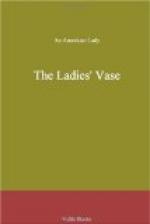To be brief, her parents succeeded in baffling nature’s promise, but failed of the fulfillment of their own. At twenty, Jemima was a puzzle to every body, and a weariness to herself. Conscious of her powers, but not knowing how to spend them, she gave in to every imaginable caprice. Having made the discovery of her superiority, she despised the opinions of others, while her own were too ill-formed to be her guide. Proud of possessing talent, and yet ashamed to show it; unaccustomed to explain herself; certain of being misunderstood, and least of all understanding herself; ignorant, in the midst of knowledge, and incapable with unlimited capacity; tasteless for every thing she did, and ignorant how to do what she had a taste for, her mind was a luxuriant wilderness, inaccessible to others, and utterly unproductive to its possessor. Unpleasing and unfitted in the sphere she was in, and yet unfitted by habit and timidity for any other, weariness and disgust were her daily portion; her fine sensibilities, her deep feelings, her expansive thoughts, remained; but only to be wounded, to irritate, to mislead her.
Where is the moral of my tale, and what the use of telling it? I have told it because I see that God has his purposes in every thing that he has done; and man has his own, and disregards them. And every day I hear it disputed, with acrimony and much unkindness, what faculties and characters it is better to have or not to have, without any consideration of what God has given or withheld; and standards are set up, by which all must be measured, though, alas! they cannot take from or add one cubit to their statures. “There is one glory of the sun, and another glory of the moon, and another glory of the stars; for one star differeth from another star in glory.” Why do we not censure the sun for outshining the stars, and the pale moon for having no light but what she borrows?
Instead of settling for others what they ought to be, and choosing for ourselves what we will be, would it not be better to examine the condition in which we are actually placed, and the faculties actually committed to us? and consider what was the purpose of Heaven in the former, and what the demand of Heaven in the occupation of the latter? If we have much, we are not at liberty to put it aside, and say we should be better without it; if we have little, we are not at liberty to be dissatisfied, and aspiring after more. And surely we are not at liberty to say that another has too much, or too little, of what God has given! We may have our preferences, but we must not mistake them for standards of right.




